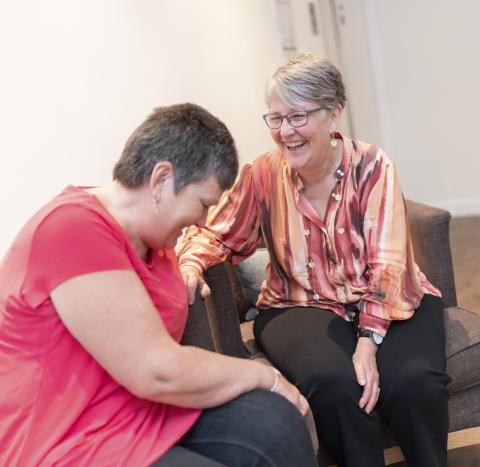Sometimes you might feel that you should be able to cope or that your feelings are so overwhelming you don't know how anyone could help, but try to be kind to yourself. There are a range of professional services available to support you in working through the harder parts of life.
Healthcare professionals
Talk to your team looking after you, they will be able to help. This may be your GP or Clinical Nurse Specialist (CNS). They can refer you to more specialist services for further support.
Psychological therapies
What are they?
Psychological therapies are a form of emotional support, which many people find helpful at difficult times in their lives. They involve talking to a trained professional about your thoughts and feelings, and can help you to manage them.
How can they help?
Healthcare practitioners who work with people who have cancer have been trained to understand how cancer may cause difficulties for you emotionally, practically and in relationships. Just getting things off your chest can help. You can discuss the problems you're having and explore difficult feelings in a safe and confidential space. Being able to talk through frustrations, anger, sadness and fears with a trained professional can help you to feel more in control.
What type of therapies are available?
Counselling
Counselling gives you the opportunity to speak to someone about your fears or concerns. A counsellor's job is to listen and allow you to talk. You may be able to access free counselling. In some areas of the UK you can book your own NHS counselling (self-referral) but if this isn’t possible, speak to your GP to see what’s available to you. Many cancer support centres and hospices also offer free counselling services.
Alternatively, if you choose to take up private counselling you can find a registered counsellor through the British Association of Counselling and Psychotherapy (BACP).
The charity Mind also has helpful information about accessing counselling.
Psychological support
Psychological support will look at how cancer has affected your life and wellbeing. A psychologist will be able to talk with you about the impact of cancer in more depth and they can then decide what type of psychological treatment may help you. The British Psychological Society (BPS) can help you find a psychologist in your area and offers services in different languages if English is not your first language.
Cognitive behavioural therapy (CBT)
CBT is a very practical way of looking at emotional distress. It focuses less on the causes of your distress and more on how to improve your reactions to difficult situations. CBT examines how our ways of thinking can trigger difficult emotions and behaviours. The therapy then works to change behaviour by finding new ways to think about problems. You may be able to access free CBT. In some areas of the UK you can book your own NHS CBT (self-referral) but if this isn’t possible, speak to your GP to see what’s available to you.
If you choose private CBT, the CBT Register UK allows you to search for therapists in your local area.
Psychotherapy
Psychotherapy is similar to counselling but involves the therapist trying to discover where emotions or difficulties might be coming from. A therapist will explore what’s happening in your life now and what’s happened to you in the past that might affect how you're feeling and behaving. Psychotherapy can help you understand why you behave in certain ways and how you might change this behaviour. You can use the UK Council for Psychotherapy’s 'find a therapist' service to find therapists in your local area.
Mindfulness-based therapies
Mindfulness-based therapies help you focus on the present moment. Mindfulness is a form of non-religious meditation that can have benefits for your sense of wellbeing, help with stress and anxiety and can be practised at home. Mindfulness meditation courses are available locally in many areas and many hospices and cancer support centres are now running mindfulness groups and training sessions. The Mental Health Foundation has more information about the different types of mindfulness and offer mindfulness courses.
Watch Lorrie Cameron, Centre Head of Maggie's Lanarkshire, talk about the benefits of mindfulness and direct you through a few simple mindfulness exercises to help you stay relaxed in the present moment:
The NHS has more information and advice on mental health.
Last reviewed: August 2022
To learn more about our review process, take a look at our information standards.



